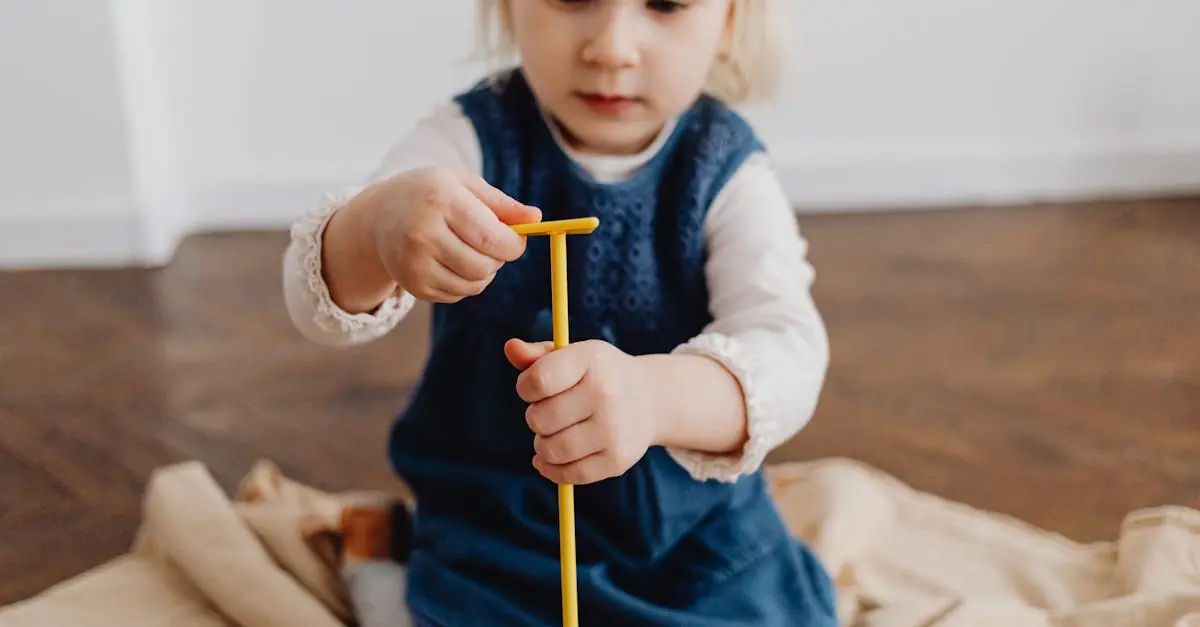Navigating the wild world of preschoolers can feel like trying to tame a tornado. One moment they’re sweetly singing their favorite song, and the next, they’re declaring war on broccoli. Parents often find themselves in a whirlwind of emotions, from joy to sheer exasperation. But don’t worry—there’s a light at the end of the tunnel, and it’s not just the glow of a screen at bedtime.
With the right tips in hand, parenting can transform from chaos to a delightful adventure. Whether it’s mastering the art of negotiation over snack time or discovering creative ways to encourage sharing, these strategies will help parents turn everyday battles into laughter-filled victories. Get ready to unlock the secrets to raising happy, well-adjusted preschoolers while keeping your sanity intact.
Table of Contents
ToggleUnderstanding Preschool Development
Preschool development encompasses various growth areas crucial to a child’s overall well-being. Recognizing these aspects helps parents navigate this exciting life stage effectively.
Key Milestones in Preschool Age
Children typically reach key milestones between ages three and five. Language skills enhance significantly, with vocabulary expanding to approximately 1,000 words. Motor skills become refined, allowing children to run, jump, and climb more confidently. Social interactions increase, as sharing and taking turns emerge as critical lessons. Parents should expect emotional awareness to grow, with children expressing feelings more clearly and recognizing others’ emotions.
Emotional and Social Growth
Emotional and social growth flourishes during preschool years. Children develop self-control, which helps manage their impulses and reactions. Friendships become essential, increasing opportunities for cooperative play and teamwork. Empathy starts to form, allowing children to understand and respond to others’ feelings. Conflict resolution skills also emerge, enabling preschoolers to negotiate needs and wants with peers. Parents can encourage this growth by fostering open communication and providing structured social interactions.
Effective Communication Strategies
Effective communication plays a vital role in parenting preschoolers. Parents can create strong connections with their children by using specific techniques and encouraging open dialogue.
Active Listening Techniques
Active listening involves fully concentrating on what a child says. It’s important to maintain eye contact and nod in acknowledgment. Repeating back what the child shares reinforces understanding and shows they are heard. Asking clarifying questions can also promote deeper discussions. For example, when a child expresses a concern about a friend, asking, “What happened with your friend?” encourages further sharing. By making sure the environment is distraction-free, listening becomes more effective. Engaging with kids at their level—both physically and emotionally—can enhance their willingness to communicate. These techniques foster trust, allowing preschoolers to feel valued during conversations.
Encouraging Expression of Feelings
Encouraging children to express their feelings helps them process emotions healthily. Providing words for various emotions can empower preschoolers to articulate their feelings. For instance, saying “It’s okay to feel sad” normalizes feelings, helping them understand emotional responses. Using stories or role-play can illustrate different emotional scenarios, promoting empathy. Asking open-ended questions like “How did that make you feel?” invites children to explore their emotions further. Modeling emotional expression is also key; when parents share their feelings, they offer practical examples. Acknowledging and validating a child’s feelings creates a safe space, ensuring they develop emotional intelligence and self-awareness.
Creating a Positive Learning Environment
Creating a positive learning environment sets the foundation for preschoolers’ growth and development. This environment nurtures curiosity and fosters a love for learning.
Importance of Routine
Establishing a consistent routine is essential for preschoolers. Routines provide structure, helping children feel secure and understand what to expect throughout the day. Engaging them in daily activities, such as meals, playtime, and learning sessions, reinforces consistency. Choosing specific times for these activities enhances predictability. Consistent routines also aid emotional regulation, as children learn to anticipate transitions and cope with changes. Benefits include decreased anxiety and improved focus, allowing preschoolers to thrive in their learning experiences.
Choosing Educational Activities
Selecting appropriate educational activities promotes cognitive and social development. Focus on age-appropriate games and projects that stimulate curiosity. Activities like storytelling, arts and crafts, or simple science experiments engage young minds and encourage exploration. Groups offer valuable opportunities for social interaction, enhancing communication and cooperation skills. Prioritizing hands-on activities ensures that learning remains enjoyable and impactful. Incorporating learning objectives within play keeps preschoolers engaged and helps them retain knowledge more effectively.
Discipline and Setting Boundaries
Establishing discipline and setting boundaries is crucial for preschoolers. Parents can help their children understand expectations and appropriate behaviors through various techniques.
Positive Reinforcement Methods
Utilizing positive reinforcement encourages desired behaviors in preschoolers. Rewards such as praise, stickers, or special privileges can motivate children to perform well. Consistency in recognizing good behavior helps solidify its importance. By focusing on what children do right, parents create a supportive environment that boosts self-esteem. Implementing a reward system for achieving small goals encourages ongoing positive actions.
Handling Tantrums and Disagreements
Managing tantrums requires a clear strategy. Parents should remain calm and composed during outbursts. Acknowledging feelings while setting boundaries helps children feel understood. Choosing the right moment for discussion allows for better communication. Offering choices within limits can reduce power struggles, giving preschoolers a sense of control. Reinforcing the importance of expressing feelings verbally aids in conflict resolution skills. With guidance, children learn to navigate their emotions and disagreements effectively.
Building Emotional Intelligence
Emotional intelligence is crucial for preschoolers as they navigate their feelings. Parents play a key role in guiding this development.
Teaching Empathy and Kindness
Fostering empathy starts with modeling caring behavior. Parents can demonstrate kindness in everyday situations, encouraging children to notice others’ feelings. Storytime provides a great opportunity to explore various perspectives in characters. Discussing the emotions of story characters helps preschoolers recognize different feelings. Engaging in group activities develops teamwork and kindness, reinforcing the importance of helping peers. Praise acts of compassion, ensuring children understand their positive impact on others. Additionally, practicing simple acts of kindness, such as sharing or offering comfort, builds a foundation for empathy.
Supporting Independence and Decision Making
Encouraging independence allows preschoolers to explore their choices confidently. Parents should offer age-appropriate choices during daily activities, such as selecting clothes or snacks. Empowering children in decision-making fosters a sense of ownership. Incorporating routine tasks, like setting the table, promotes responsibility. Allowing them to make small decisions in playtime enhances cognitive development. It’s important to discuss the potential outcomes of their decisions, guiding them in weighing options. Providing gentle support during mistakes teaches resilience, helping them learn from experiences. This approach nurtures self-confidence, setting the stage for future independence.
Navigating the preschool years can be both exhilarating and challenging for parents. By implementing effective strategies and fostering a nurturing environment, parents can support their children’s growth and emotional development. Encouraging open communication and providing opportunities for social interaction lays the groundwork for strong relationships and emotional intelligence.
Establishing routines and setting clear boundaries helps preschoolers feel secure while promoting positive behaviors. Ultimately, a balanced approach that combines structure with love and understanding will create a joyful atmosphere for both parents and their little ones. Embracing this journey with patience and creativity will lead to lasting memories and a strong foundation for future development.






